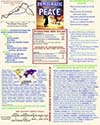[First published May 31, 2005] To me the unit of measure is always the individual –only the individual exists in nature and the group is an abstraction, but a necessary abstraction and benign one as long as we keep in front that it is made up of real individuals.
Dave Schuler commented:
That is patently demonstrably false. In every part of the world at every time in the history of the species, human beings have lived together in groups. We are social animals and we have always been social animals. We are not cats. For human beings groups have precisely as much objective existence as the individual.
We are also not ants or bees. The prevalent human mode of life has been the small group (although not exclusively the family group) for most of our history and pre-history. The village.
Ted Kaczynski is not the epitome of human beings—he’s the pitiful exception.
Your litany of countries that divided are all divisions along ethnic lines. Does one join an ethnic group (the act of an individual) or is one born into it?
This disagreement is of no little importance. Politicians and demagogues often treat groups as real, existing things, as though the individual members were secondary to the group. Indeed, much democide is carried out against individuals, not because of their personal qualities or crimes, but because of their group membership, such as bourgeoisie, Jews, landlords, Armenians, infidels, and so on.
However, groups have no real existence, as do individual human beings, although it is common to reify them. Groups, even the family, is a socio-cultural construction, more simply, a concept, that wholly exists in the mind. It cannot be kicked, touched, or seen. Even its supposedly outward manifestations, such as IBM’s headquarters building, a Federal courthouse, Catholic Mass have a group meaning that we project onto them.
Similarly, with racial and ethnic identities, with which clever politicians are often trying to make individuals identify (identity politics — see link below), are socio-cultural in origin, and exist only within certain cultures at certain times. True, there are certain physical characteristics identified with such groups, but this is the way the concept, say of Jew, has become socioculturally defined in our minds, and that can readily change as do cultures. There is always a subset of human beings that share certain characteristic, and generally these shared characteristics do not define a group presently, such as hair or eye color, skinniness, or nose size, or behavior like jogging, card playing, or swimming.
Note however how the reification of the group has led to laws that ignore the individuals involved, such as racial set asides and university admission policies that give special credit to Blacks and Hispanics, regardless of the capabilities and background of individual Black and Hispanics in comparison to the others that are discriminated against. Thus, a privileged Hispanic from a rich family could be given preference over a poor non-Hispanic who has had to work his way through school and overcome a broken family.
True, everywhere people have chosen to live in groups. These are, however, cultural-traditional groups with which individuals identify. But, that makes them no less individual human beings, with their own perceptions, expectations, sense of esteem, and so on. Nor does it make the groups any more real. To the outsider, they are only the clustering of individuals on which we impose certain concepts, such as family, clan, sect, and tribe. Note, however, the time and place conditionality of such groupings. For example, tribal membership is of utmost social significance in many African countries. It doesn’t exist in the United States outside of Indian reservations.
Can you tell me your tribe or clan?
Link of Note
“Identity politics” In the Stanford Encyclopedia of Philosophy
Introduction:
The laden phrase “identity politics” has come to signify a wide range of political activity and theorizing founded in the shared experiences of injustice of members of certain social groups. Rather than organizing solely around ideology or party affiliation, identity politics typically concerns the liberation of a specific constituency marginalized within its larger context. Members of that constituency assert or reclaim ways of understanding their distinctiveness that challenge dominant oppressive characterizations, with the goal of greater self-determination.



 Posted by rudyrummel
Posted by rudyrummel 






